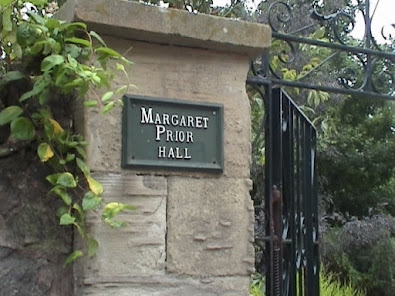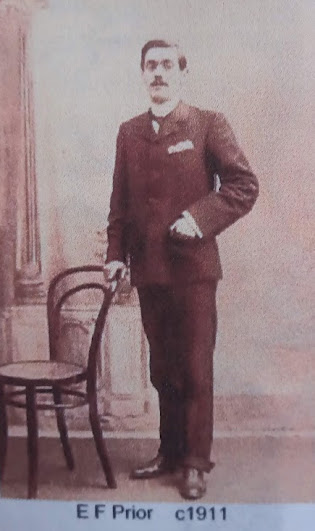THE PRIOR FAMILY OF CHICHESTER
Introduction:
family line of descent
Henry Prior (1640?-1689) West Itchenor = Mary(d1682 at Birdham)
Henry Prior (b1660?) yeoman wheelwright, Sidlesham = Ann
Earwicker (3rd wife)
Richard Prior (1696-1733) yeoman, Birdham =
Susannah Osborn (1697-1767)
Henry Prior(1730-1764) yeoman, Birdham = Sarah Spratt (1732-17890
Richard Prior (1758-1827) yeoman, Donnington = Ann Fogden (1764-1828)
John Francis Prior (1789-
1829) grocer = Pamela Ann Woods(1790-1858)*
John Woods Prior (1813-1875)
woolstapler = Amelia Underdown
Ebenezer Prior (1848-1927) woolstapler
= Emily Penney
Ebenezer Francis Prior (1882?-1975) woolstapler = Elizabeth Kennedy
Ebenezer John Woods Prior
(1914-1989)woolstapler = Gertrud Beyer (1911- 1986)
Michael Raymond Ebenezer
Prior (1942- )teacher= 1 Lindsay Sims
(1943 - 1994);
Janine Lindsay Prior (1970- ) = Sean
Carter
David John Prior (1972-
) = Frances Crow
Andrew Michael Prior (1977-
)= Deborah Callen
= 2 Gwendoline (Wendy) Ennis (1951-)
Leila Ennis (1979-
)
Adrian Ennis (1985- ) = Nicola Hammond
(* When Pamela Ann was
widowed she subsequently married Captain George Cosens [1790-1850], a captain
in the Sussex
regiment, whose first wife Kate Gadd had died in 1831).
THE PRIORS OF SUSSEX
In 1824 we find the earliest
mention in the records of Providence Chapel in Chichester
of the name of Prior, first in the person of John Francis Prior (1789-1829),
who was received into membership in that year, becoming a trustee; then also of
his son John Woods Prior (1813-1875)
John Francis Prior is buried
in Donnington churchyard. The Priors were a yeoman family who had previously
farmed at Donnington since about 1780, and can be traced in the villages south
of Chichester - Birdham, Sidlesham, North Mundham, East
Wittering predominantly - to the second half of the 17th
century.
(A pedigree, compiled by Rev. J S Reynolds, tracing their descent from
Henry Prior who died at West Itchenor in 1689/90, is deposited at the County
record Office, Chichester. Family tradition claims Matthew Prior, statesman and
poet (1664-1721) as a relation, and this appears not improbable; also Thomas
Prior (1682-1751) founder of the Royal Dublin
Society, which although the Priors of West Sussex
used the same arms and crest, seems less likely).
Lieutenant Henry Fogden
Prior R.N., brother of John Francis Prior, served at Trafalgar, aged 21, as
Master’s Mate aboard HMS Belleisle. See my blog entry of September 18th 2019 entitled 'Henry Prior and Trafalgar' for more about this.
See
http://mpriorblog.blogspot.com/2019/09/normal-0-false-false-false_18.html
John Francis Prior
John Francis Prior lived in North Street, Chichester. He married Pamela Anne Woods. At the age of
18 Pamela, who had been brought up in the established church, went to live in
Havant, where she found that “What we then thought the gospel was not preached
in the church” and transferred to the independent chapel in Havant. Here she
met John Prior and married him when she was 21. They moved to Chichester
where eventually they came to worship at Providence
Chapel. Of their three children only
John Woods Prior (1813-1875) lived to maturity.
John
Woods Prior
He became a principal pillar
of the chapel. He was the founder of the family wool-stapling business in Tower Street,
Chichester, which subsequently expanded with branches at Bradford and Taunton. He married Amelia
Underdown, a member of an ancient Devonshire
family seated at Widoworthy Barton. The most noteworthy of their children were
Richard Henry Prior, M.D., J.P., mayor of St Albans in 1877, Ebenezer Prior,
woolstapler, mayor of Chichester in 1896, and
George Cosens Prior, a solicitor who became a unitarian minister.
There is a story about John
Woods Prior’s childhood. His schoolmaster was a very severe one and was very
fond of thrashing. John was very clever and good at arithmetic; he was put into
a new rule and given a sum to do. The master would not instruct him into the
rule but on the Saturday told him that if the sum was not brought properly done
on the Monday morning he would give him a good thrashing. He was going to his
grandfather Richard’s house in Donnington that Saturday afternoon - he was
naturally much distressed at what awaited him on Monday morning and earnestly
prayed to God that he would show him how to do the sum. No one knew of it but
in the afternoon he went out into the Donnington House garden to play, and
there was a leaf from an exercise book which had evidently blown over the hedge
and John picked it up. To his astonishment there was the sum in full which he
had been ordered to do. He never forgot this, and in later life he was often
heard to say that although in his active life he had many direct answers to
prayer he never forgot this one, for it was the means of leading him to take
all things in prayer to God.
‘A short account of the death of the late Mr J
W Prior of Chichester’ in the Gospel Advocate, 1875, states “John Woods Prior was a devoted
man of God, and the prosperity of the chapel during the third quarter of the 19th
century may be partly attributed to his constant attention to the cause. Called
by grace in early years, his life throughout was a bright example of practical
godliness, and a witness to the reality of his religion…. his loving and
peaceable spirit, tender fear of god, firmness in the truth, and upright walk
in life rendered him greatly beloved by the Church and congregation worshipping
at Providence Chapel; and indeed by all the Lord’s people who knew him. These were
not a few, as for 25 years his house was the home of all the Lord’s servants
who supplied at the chapel.” When he died in 1875 he made an edifying death,
though afflicted by a painful disease which caused his last illness to be a
time of special trial. Replying to a remark of his wife about heaven he said “I
long to be there. A dear Christ. I love His person. Precious Christ. Mercy,
nothing but mercy! His loveliness. I see Him. I know Him, and the fellowship of
His sufferings. I love Him greatly.” The
Prior family often engendered men of ‘nervous’ disposition, and J W Prior was no exception. Writing to a
friend in 1874 he said “I am thankful to say, that I am better than at one
time; but my nerves are still sensitive …
I hope that the day will come when the Lord will deliver me from all my
fears, and enable me to rejoice more fully in His name, for His name is indeed
precious; and unto them that love his name, he is precious.”
Ebenezer Prior
Ebenezer Prior became a
trustee of the chapel in 1880. He married Emily Penney. Their second daughter
Mary married Ernest Shippam, head of a firm whose name has become a household
word far beyond Chichester. Ebenezer resigned
his membership in 1889 owing to a difference of opinion over the propriety of
his serving as a city councillor - he was mayor in 1896.
A special edition of
‘Chichester Views and reviews’ in 1895/6 had a long article about Ebenezer
Prior which says
“The woolstapling business carried on
by Mr Ebenezer Prior has a widespread and distinctive celebrity at home and
abroad. This is a very old business that has been established over a century,
and has always been connected with the same family. It was originally founded
by Mr Reeves; and his grandson Mr Ebenezer Prior, the present Chief Magistrate
of Chichester, has for many years been sole proprietor and has greatly enhanced
the prestige of the business. . . . . .
. .Mr Prior is well known for his active interest in the moral as well as the
material welfare of the working classes generally, and this is shown especially
in the care he takes for the interests of his own employees. Being a strong
advocate of total abstinence, he shows a practical desire for keeping his men
from the public house, by providing on the premises the means to obtain beverages
of a non-alcoholic nature. He has provided a special room equipped with a gas
stove, and here the men have the privilege of refreshing themselves with a cup
of excellent tea at any time they desire it. This is quite in keeping with Mr
Prior’s character. He has for many years taken a leading part in many social,
educational and philanthropic movements in the city as well as in public
affairs tending to the general welfare.
He is President of the Total Abstinence Society, secretary to the
Sanitary Association, and a manager of the Lancastrian voluntary Schools. He is
at present interesting himself in obtaining good secondary educational
advantages for the city. He is an active member of the Board of Guardians, and
was largely instrumental in procuring trained instead of pauper nurses in the
workhouse, and in obtaining extension of the Poor Law area, as well as altering
the dietary table in the workhouse, and in enabling inmates to wear other than
pauper uniform when temporarily visiting the outside world. Recently he has
been re-elected as Chairman of the Board of Guardians for the 5th
time, a recognition of his success in extending the boundary of the Union and
amalgamating the 13 parishes into one parish, now the parish of Chichester. Mr Prior was also Chairman of the Rural
District Council of Chichester for the whole of its existence. He is Justice of
the Peace for both the city of Chichester and
the county of Sussex, and has since 1889 been a member
of the City Council, of which he is now Chief magistrate. His election to the
mayoral chair was a fitting honour. He was for many years vice-chairman of the
Drainage, Extension, Lighting and other committees, and succeeded with the
co-operation of others in completing against severe opposition the drainage of
the city, in extending two borough boundaries, in settling the Lease question
on the basis of enfranchisement, in the settlement of the Asylum contribution,
and in the consolidation of the city debt and the issue of city stock. Mr Prior
is negotiating for the purchase of the water works by the corporation, and has
shown himself to be one of the most able, dignified, impartial and public
spirited chief magistrates that Chichester has
had for many years. Since he was elected mayor in 1895 he has presided at the
luncheon given by the Mayor and Corporation to the new Bishop of Chichester
after the ceremony of enthronement, all the mayors of Sussex attending in their robes and
chains of office. The Mayor, who is himself a nonconformist, belonging to the
Independent body, was born in Chichester on
October 18th 1848, so that he is a comparatively young man. His
private residence is Northleigh House, Tower Street, and he is in telephonic
communication with his three warehouses, so that the business in each
department is always under the personal control of either Mr Prior or his son.”
I have written in much more detail about Ebenezer Prior in my blog entry of January 31 2020, entitled 'A remarkable man'.
see
http://mpriorblog.blogspot.com/2020/01/
 |
| Woolsorting |
 |
| Woolsorters |
The firm of Ebenezer Prior Ltd, Woolstaplers and Fellmongers has long since disappeared from Chichester, but the memory lingers on in these signposts.















































